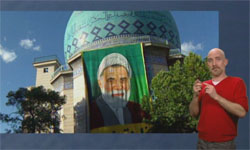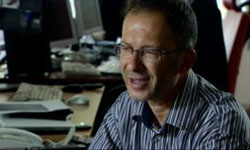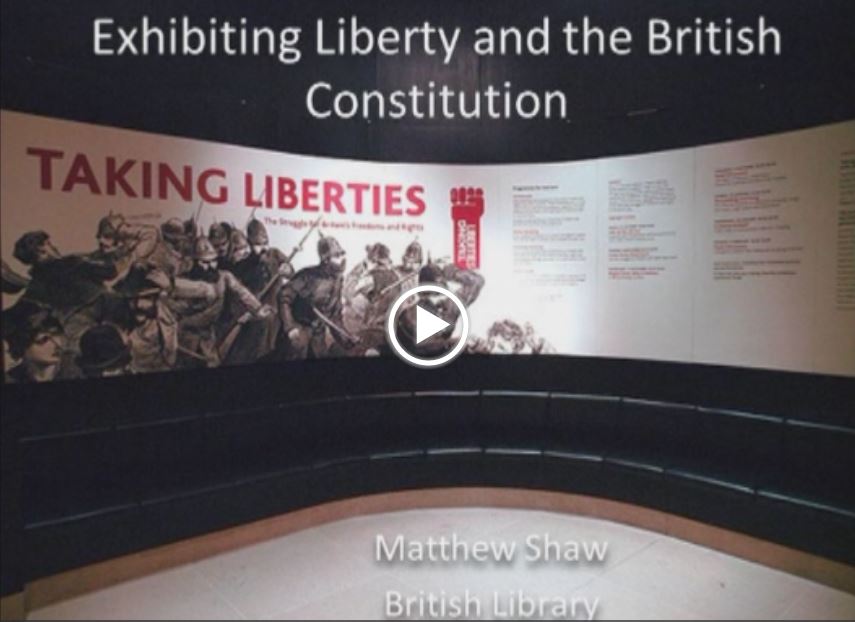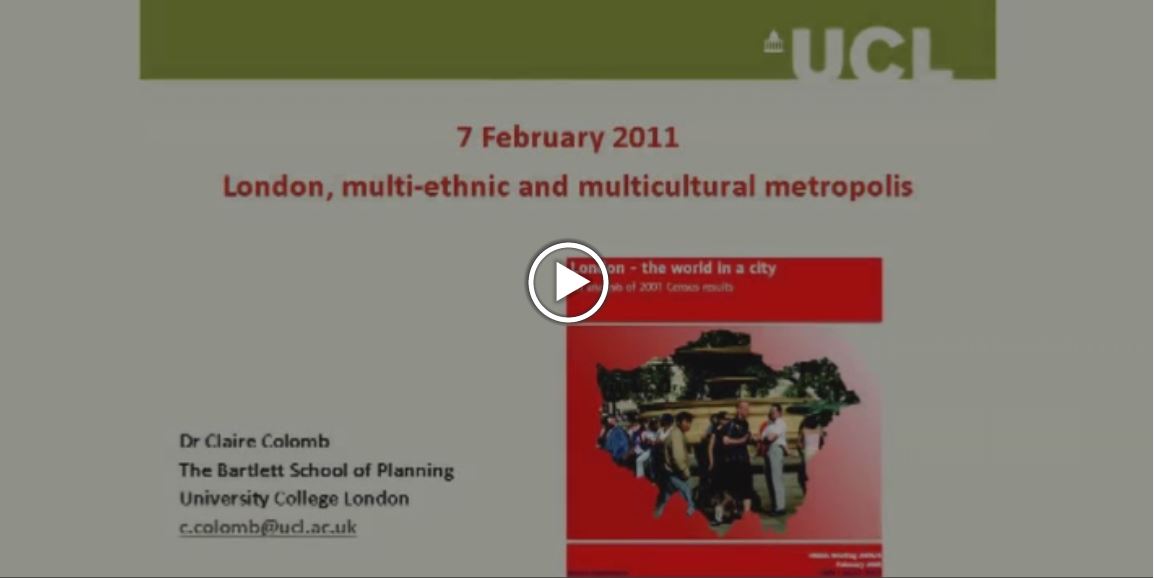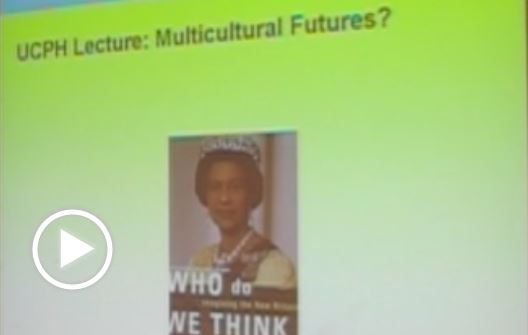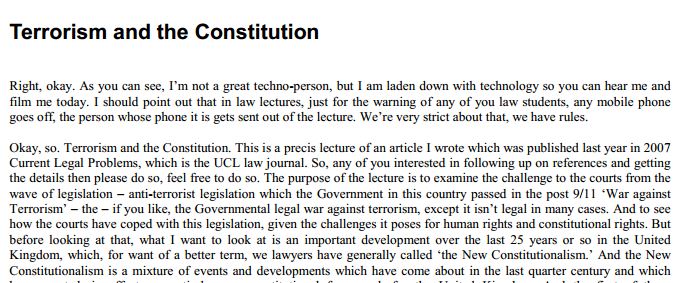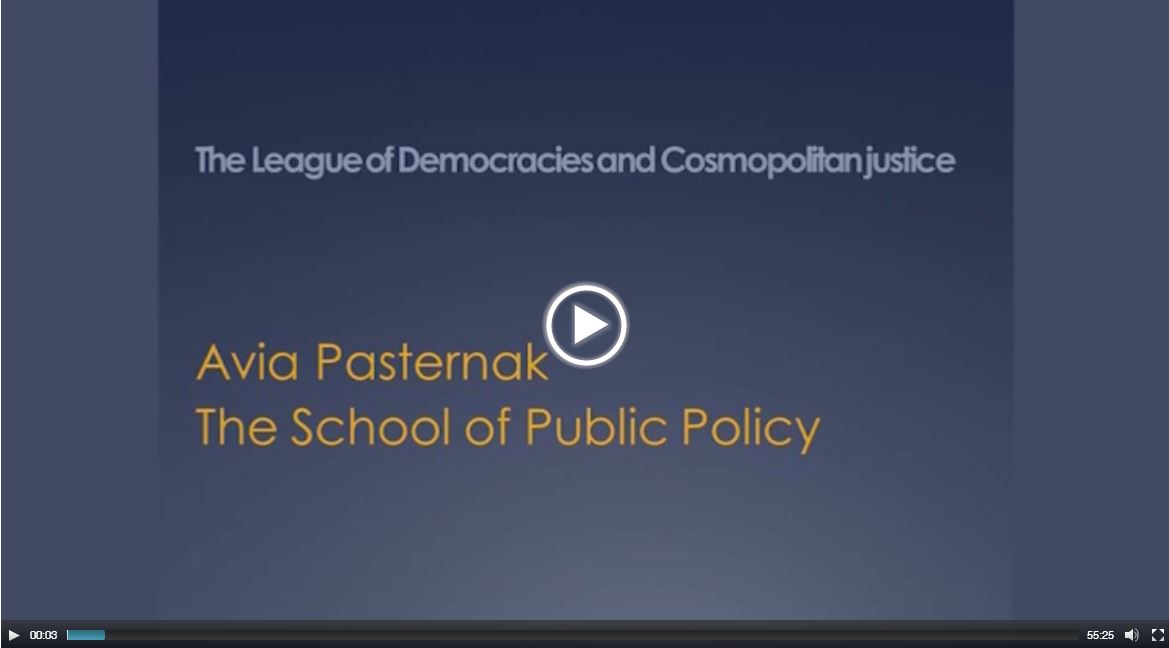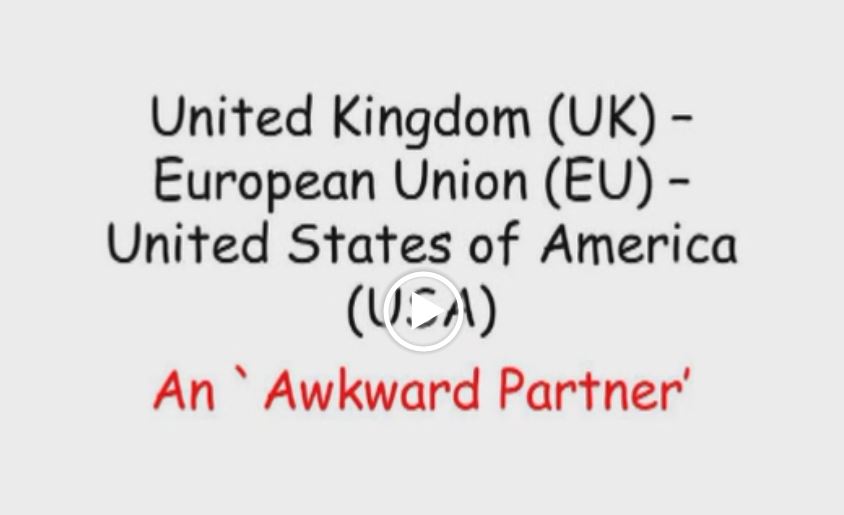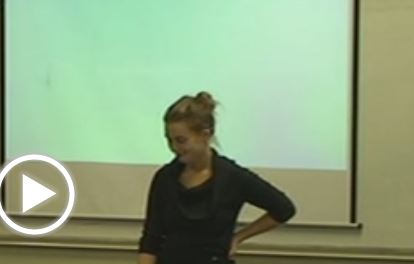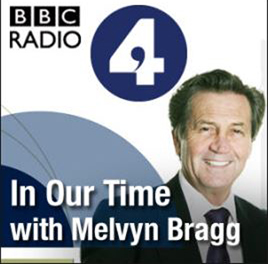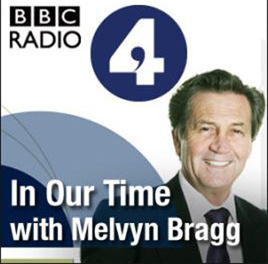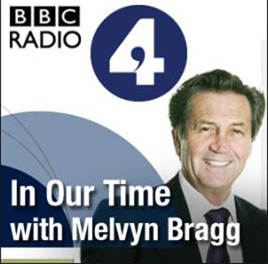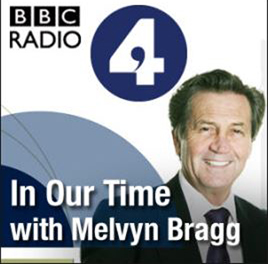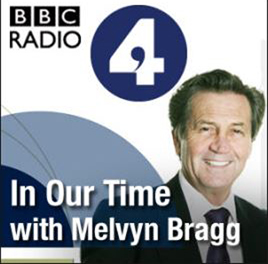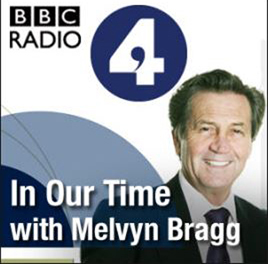Select one or more of these popular tags:
-
Iran and the West. Episode 2. The Pariah State
-
Dai Richards
Second episode in the documentary series marking the 30th anniversary of the Iranian Revolution. Inside stories are told by two ex-presidents of Iran, Hashemi Rafsanjani and Mohammad Khatami, by two founders of Iran's Revolutionary Guard, and by leading westerners including Secretaries of State George Shultz, Warren Christopher and Madeleine Albright.
- British-Sign-Language
- Politics & Public Policy
- BSL subtitles
- 58
Second episode in the documentary series marking the 30th anniversary of the Iranian Revolution. Inside stories are told by two ex-presidents of Iran, Hashemi Rafsanjani and Mohammad Khatami, by two founders of Iran's Revolutionary Guard, and by leading westerners including Secretaries of State George Shultz, Warren Christopher and Madeleine Albright.
For months, a popular uprising has been fighting an unseen and bloody battle against the Syrian regime. Panorama has been filming inside Syria, and can now tell the full story of those struggling against President Assad and the truth about his brutal crackdown against his own people.
- British-Sign-Language
- Politics & Public Policy
- BSL subtitles
- 30
For months, a popular uprising has been fighting an unseen and bloody battle against the Syrian regime. Panorama has been filming inside Syria, and can now tell the full story of those struggling against President Assad and the truth about his brutal crackdown against his own people.
-
Margaret Thatcher - The Long Walk to Finchley
-
Niall MacCormick , 2008
A light-hearted retelling of the true story of future prime minister Margaret Thatcher, during the fifties when, working as a research chemist, she begins her attempts to be selected for parliament, and meets her future husband Dennis.
- Films
- No subtitles
- 84
A light-hearted retelling of the true story of future prime minister Margaret Thatcher, during the fifties when, working as a research chemist, she begins her attempts to be selected for parliament, and meets her future husband Dennis.
-
Exhibiting Liberty and the British Constitution
-
Mathew Shaw
Diploma 2011
- Lectures
- Politics & Public Policy
- No subtitles
- 52
Diploma 2011
-
Health and Social Welfare in an Ageing World. GPC Lecture
-
Dr James Nazroo
GPC Lecture 2006
- Lectures
- Politics & Public Policy
- No subtitles
- 62
GPC Lecture 2006
-
Housing Challenges and Planning Strategies in Southern England (with transcript)
-
Dr Nicholas Gallent
Urban Exploration Program Lecture
- Lectures
- Politics & Public Policy
- No subtitles
- 60
Urban Exploration Program Lecture
-
Immigration, Jobs and Wages: Theory, Evidence and Opinion
-
Dr Cristian Dustmann
Diploma Lecture 13 2005-2006
- Lectures
- Politics & Public Policy
- No subtitles
- 60
Diploma Lecture 13 2005-2006
-
London - Multi-Ethnic and Multicultural Metropolis
-
Dr Claire Colomb
Diploma 2011
- Lectures
- Politics & Public Policy
- No subtitles
- 55
Diploma 2011
-
Multicultural Futures - Current Debates
-
Dr Clare Dwyer
UPCH 2008
- Lectures
- Politics & Public Policy
- No subtitles
- 60
UPCH 2008
-
Technology, Values and Politics
-
Dr Charles Thorpe
UPCSE Lecture 2005
- Lectures
- Politics & Public Policy
- No subtitles
- 60
UPCSE Lecture 2005
-
Terrorism and the Constitution (with transcript)
-
Rodney Austin
GPC/Pre-sessional Lecture 2008
- Lectures
- Politics & Public Policy
- No subtitles
- 71
GPC/Pre-sessional Lecture 2008
-
The League of Democracies and Cosmopolitan Justice
-
Avia Pasternak , 2014
Pre-Sessional Lecture 2014
- Lectures
- Politics & Public Policy
- No subtitles
- 56
Pre-Sessional Lecture 2014
-
The UK, EU and US Since 1945
-
Dr Dave Edye
Pre-Sessional Lecture 2011
- Lectures
- Politics & Public Policy
- No subtitles
- 63
Pre-Sessional Lecture 2011
-
What Do Crime and Diseases Have in Common?
-
Dr Shane D. Johnson
Pre-Sessional 2007
- Lectures
- Politics & Public Policy
- No subtitles
- 65
Pre-Sessional 2007
-
Who's Afraid of Multilingualism?
-
Raphaela Armbruster
UPCH 2007
- Lectures
- Politics & Public Policy
- No subtitles
- 49
UPCH 2007
-
Book of the Week - Part of the Pattern: Memoirs of a Wife at Westminster
-
Edna Healey
Edna Healey has been married to Denis Healey for more than fifty years and has seen parliamentary life, both in power and opposition from the inside.
Edna Healey has been married to Denis Healey for more than fifty years and has seen parliamentary life, both in power and opposition from the inside.
-
Book of the Week - Salesman in Beijing
-
Arthur Miller
In 1983, Arthur Miller was invited to Beijing to direct the first Chinese production of Death of a Salesman. This book is the diary he kept during of that unique and eccentric production. The diary portrays the challenges that faced Miller as a Liberal American playwright and director working in Communist China. Miller's major concern was how to overcome the linguistic and cultural difficulties of trying to communicate his artistic vision to a Chinese cast. The result is not merely an interesting account of a highly unusual production, but it also reveals the process any production may go through, and is an insight into the mind of a considerate director.
In 1983, Arthur Miller was invited to Beijing to direct the first Chinese production of Death of a Salesman. This book is the diary he kept during of that unique and eccentric production. The diary portrays the challenges that faced Miller as a Liberal American playwright and director working in Communist China. Miller's major concern was how to overcome the linguistic and cultural difficulties of trying to communicate his artistic vision to a Chinese cast. The result is not merely an interesting account of a highly unusual production, but it also reveals the process any production may go through, and is an insight into the mind of a considerate director.
-
Book of the Week - Seize the Hour - When Nixon Met Mao
-
Margaret MacMillan
In February 1972, Nixon amazed the world with a trip to China. He was the first US President to go there -- in fact officially the first American since the Communist takeover. It was like a visit to the far side of the moon, but also a brilliant stroke of policy. With China on side Nixon could get out of Vietnam; US technology could help Mao recover from his disastrous Cultural Revolution; most of all, both needed a buttress against Soviet Russia in aggressive mood.
In February 1972, Nixon amazed the world with a trip to China. He was the first US President to go there -- in fact officially the first American since the Communist takeover. It was like a visit to the far side of the moon, but also a brilliant stroke of policy. With China on side Nixon could get out of Vietnam; US technology could help Mao recover from his disastrous Cultural Revolution; most of all, both needed a buttress against Soviet Russia in aggressive mood.
-
In Our Time - Animal Rights
-
Melvyn Bragg
Melvyn Bragg and guests discuss the role of animals in humankind's search for knowledge.
Melvyn Bragg and guests discuss the role of animals in humankind's search for knowledge.
-
In Our Time - Atrocity in the 20th Century
-
Melvyn Bragg
Melvyn Bragg and guests discuss the widespread and chilling atrocities of the 20th century.
Melvyn Bragg and guests discuss the widespread and chilling atrocities of the 20th century.
-
In Our Time - Bismarck: The Iron Chancellor
-
Richard J Evans, Christopher Clark & Katharine Lerman
Otto von Bismarck was one of Europe's leading statesmen in the 19th Century and credited with the unification of Germany. He had a voracious ambition for his home state Prussia and made it supreme among other states in the German Confederation. After vanquishing Austria and France, he led the new industrialising Germany, managing to remain in power for a further two decades. He founded one of Europe's first welfare states
Otto von Bismarck was one of Europe's leading statesmen in the 19th Century and credited with the unification of Germany. He had a voracious ambition for his home state Prussia and made it supreme among other states in the German Confederation. After vanquishing Austria and France, he led the new industrialising Germany, managing to remain in power for a further two decades. He founded one of Europe's first welfare states
-
In Our Time - Catherine the Great
-
Melvyn Bragg
In Moscow's Tretyakov Gallery hangs perhaps the most well-known picture of Russia's most well-known ruler. Dimitri Levitsky's 1780 'Portrait of Catherine the Great in the Justice Temple' depicts Catherine in the temple burning poppies at an altar, symbolising her sacrifice of self-interest for Russia. Law books and the scales of justice are at her feet, highlighting her respectful promotion of the rule of law. But menacingly, in the background an eagle crouches, suggesting the means to use brutal power where necessary. This was one of many images that Catherine commissioned that demonstrated her skill at manipulation and reinvention.
In Moscow's Tretyakov Gallery hangs perhaps the most well-known picture of Russia's most well-known ruler. Dimitri Levitsky's 1780 'Portrait of Catherine the Great in the Justice Temple' depicts Catherine in the temple burning poppies at an altar, symbolising her sacrifice of self-interest for Russia. Law books and the scales of justice are at her feet, highlighting her respectful promotion of the rule of law. But menacingly, in the background an eagle crouches, suggesting the means to use brutal power where necessary. This was one of many images that Catherine commissioned that demonstrated her skill at manipulation and reinvention.
-
In Our Time - China: The Warring States Period
-
Melvyn Bragg
400 BC to 200 AD is known as the Axial Age, when great civilisations in Asia and the Mediterranean forged the ideas that dominated the next two thousand years. In China the equivalent to the Golden Age in Greece was the Warring States Period. It was a time of political turmoil, economic change and intellectual ferment that laid the foundations for the first Chinese Empire. Astronomy was systematised, the principles of Yin and Yang were invented, Confucianism grew and Taoism emerged, as a hundred schools of thought are reputed to have vied for the patronage of rival kings. Why was a period of war such a fertile age for culture and thought, what kinds of ideas were developed and how do they still inform the thinking of nearly a fifth of the world’s population?
400 BC to 200 AD is known as the Axial Age, when great civilisations in Asia and the Mediterranean forged the ideas that dominated the next two thousand years. In China the equivalent to the Golden Age in Greece was the Warring States Period. It was a time of political turmoil, economic change and intellectual ferment that laid the foundations for the first Chinese Empire. Astronomy was systematised, the principles of Yin and Yang were invented, Confucianism grew and Taoism emerged, as a hundred schools of thought are reputed to have vied for the patronage of rival kings. Why was a period of war such a fertile age for culture and thought, what kinds of ideas were developed and how do they still inform the thinking of nearly a fifth of the world’s population?
-
In Our Time - Field of the Cloth of Gold
-
Melvyn Bragg
In the spring of 1520 six thousand Englishmen and women packed their bags and followed their King across the sea to France. They weren't part of an invasion force but were attendants to King Henry VIII and travelling to take part in the greatest and most conspicuous display of wealth and culture that Europe had ever seen. They were met by Francis I of France and six thousand French noblemen and servants on English soil in Northern France and erected their temporary palaces, elaborate tents, jousting pavilions and golden fountains spewing forth red, white and claret wine in the Val D'Or.
In the spring of 1520 six thousand Englishmen and women packed their bags and followed their King across the sea to France. They weren't part of an invasion force but were attendants to King Henry VIII and travelling to take part in the greatest and most conspicuous display of wealth and culture that Europe had ever seen. They were met by Francis I of France and six thousand French noblemen and servants on English soil in Northern France and erected their temporary palaces, elaborate tents, jousting pavilions and golden fountains spewing forth red, white and claret wine in the Val D'Or.
In 1774 a tobacco farmer from Virginia with nice manners and a quiet lifestyle was moved to put himself forward as the military leader of the most massive rebellion the British Empire had ever suffered. George Washington had been a stout upholder of the status quo, regularly lending money to his ne’r-do-well neighbour simply to keep him in the plantation to which he had become accustomed. He even wrote a book on how to behave properly in polite society.
In 1774 a tobacco farmer from Virginia with nice manners and a quiet lifestyle was moved to put himself forward as the military leader of the most massive rebellion the British Empire had ever suffered. George Washington had been a stout upholder of the status quo, regularly lending money to his ne’r-do-well neighbour simply to keep him in the plantation to which he had become accustomed. He even wrote a book on how to behave properly in polite society.
In The Prince, Machiavelli's great manual of power, he wrote, "since men love as they themselves determine but fear as their ruler determines, a wise prince must rely upon what he and not others can control". He also advised, "One must be a fox in order to recognise traps, and a lion to frighten off wolves. Those who simply act like lions are stupid. So it follows that a prudent ruler cannot, and must not, honour his word when it places him at a disadvantage". What times was Machiavelli living through to take such a brutal perspective on power? How did he gain the experience to provide this advice to rulers? And was he really the amoral, or even evil figure that so many have liked to paint him?
In The Prince, Machiavelli's great manual of power, he wrote, "since men love as they themselves determine but fear as their ruler determines, a wise prince must rely upon what he and not others can control". He also advised, "One must be a fox in order to recognise traps, and a lion to frighten off wolves. Those who simply act like lions are stupid. So it follows that a prudent ruler cannot, and must not, honour his word when it places him at a disadvantage". What times was Machiavelli living through to take such a brutal perspective on power? How did he gain the experience to provide this advice to rulers? And was he really the amoral, or even evil figure that so many have liked to paint him?
-
In Our Time - Politics in the 20th Century
-
Melvyn Bragg
With Gore Vidal, American writer, commentator and author of The Smithsonian Institution; Alan Clarke, historian, politician and author of The Tories: Conservatives and the Nation State, 1922-97.
With Gore Vidal, American writer, commentator and author of The Smithsonian Institution; Alan Clarke, historian, politician and author of The Tories: Conservatives and the Nation State, 1922-97.
-
In Our Time - Slavery and empire
-
Melvyn Bragg
Slavery and empire are two themes that run right through this country’s history. Britain’s imperial project dominated at least the last three centuries of our national life. Its advocates claim it was a civilising mission by which Britain spread enlightenment and improvement across the globe. Opponents have long seen it as a brutal business, with Britons cast as cruel oppressors out to exploit a conquered world. Is our imperial history so clear cut? What if Britons were themselves captives, either as prisoners of an imperial enterprise that sucked them in, generation after generation or, in some startling cases, as slaves to foreign peoples? Is slavery an inevitable part of empire: does it come with the territory? And how did Britain finally shake it off?
Slavery and empire are two themes that run right through this country’s history. Britain’s imperial project dominated at least the last three centuries of our national life. Its advocates claim it was a civilising mission by which Britain spread enlightenment and improvement across the globe. Opponents have long seen it as a brutal business, with Britons cast as cruel oppressors out to exploit a conquered world. Is our imperial history so clear cut? What if Britons were themselves captives, either as prisoners of an imperial enterprise that sucked them in, generation after generation or, in some startling cases, as slaves to foreign peoples? Is slavery an inevitable part of empire: does it come with the territory? And how did Britain finally shake it off?
-
In Our Time - The Aristocracy
-
Melvyn Bragg
The Greeks gave us the word aristocracy; it takes its root from ‘aristo’, meaning best and ‘kratos’, meaning rule or power. And for more than five hundred years Britain was ruled by a class that was defined, at the time, as the best. They founded their ascendancy on the twin pillars of land and heredity and in terms of privilege, preferment, power, style and wealth, they dominated British society. As the Earl of Chesterfield confidently informed the House of Lords in the mid-18th century, “We, my lords, may thank heaven that we have something better than our brains to depend upon.” What made the British Aristocracy the most successful power elite in the world? And what brought about its decline?
The Greeks gave us the word aristocracy; it takes its root from ‘aristo’, meaning best and ‘kratos’, meaning rule or power. And for more than five hundred years Britain was ruled by a class that was defined, at the time, as the best. They founded their ascendancy on the twin pillars of land and heredity and in terms of privilege, preferment, power, style and wealth, they dominated British society. As the Earl of Chesterfield confidently informed the House of Lords in the mid-18th century, “We, my lords, may thank heaven that we have something better than our brains to depend upon.” What made the British Aristocracy the most successful power elite in the world? And what brought about its decline?
-
In Our Time - The Assassination of Tsar Alexander II
-
Melvyn Bragg
On 1st March 1881, the Russian Tsar, Alexander II, was travelling through the snow to the Winter Palace in St Petersburg. An armed Cossack sat with the coach driver, another six Cossacks followed on horseback and behind them came a group of police officers in sledges. It was the day that the Tsar, known for his liberal reforms, had signed a document granting the first ever constitution to the Russian people. But his journey was being watched by a group of radicals called 'Narodnaya Volya' or 'The People's Will'. On a street corner near the Catherine Canal, they hurled the first of their bombs to halt the Tsar's iron-clad coach. When Alexander ignored advice and ventured out onto the snow to comfort his dying Cossacks, he was killed by another bomber who took his own life in the blast.
On 1st March 1881, the Russian Tsar, Alexander II, was travelling through the snow to the Winter Palace in St Petersburg. An armed Cossack sat with the coach driver, another six Cossacks followed on horseback and behind them came a group of police officers in sledges. It was the day that the Tsar, known for his liberal reforms, had signed a document granting the first ever constitution to the Russian people. But his journey was being watched by a group of radicals called 'Narodnaya Volya' or 'The People's Will'. On a street corner near the Catherine Canal, they hurled the first of their bombs to halt the Tsar's iron-clad coach. When Alexander ignored advice and ventured out onto the snow to comfort his dying Cossacks, he was killed by another bomber who took his own life in the blast.

